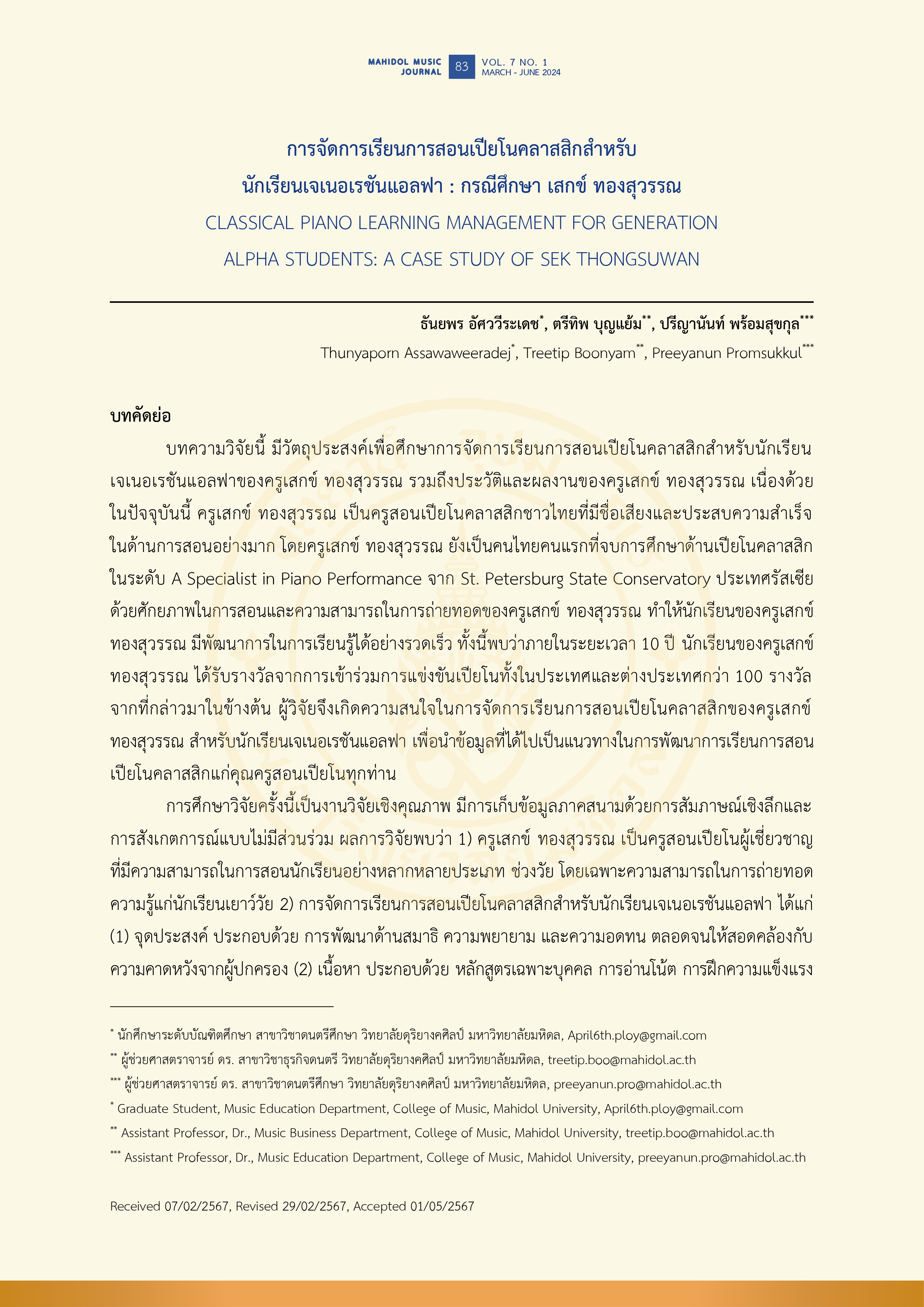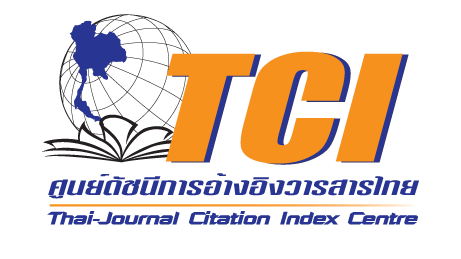CLASSICAL PIANO LEARNING MANAGEMENT FOR GENERATION ALPHA STUDENTS: A CASE STUDY OF SEK THONGSUWAN
Keywords:
Music Learning Management, Classical Piano, Generation AlphaAbstract
This article aimed to study the classical piano learning management of Sek Thongsuwan, biography, and achievements of Sek Thongsuwan. Presently, Sek Thongsuwan is recognized as a highly esteemed Thai classical piano teacher and notable achievements in teaching. Particularly noteworthy, he held the distinction of being the first Thai national to graduate with a Specialist in Piano Performance degree from St. Petersburg State Conservatory in Russia. With his exceptional teaching abilities and proficiency, he facilitates rapid advancement in the learning processes of his students. Over a span of ten years, students under Sek Thongsuwan have garnered more than 100 awards in piano competitions, both nationally and internationally. Given the aforementioned significance, the researcher was motivated to investigate Sek Thongsuwan's classical piano learning management for Generation Alpha students, aiming to enrich classical piano instruction among all piano instructors.
The research employed a qualitative research methodology. Data were collected by using in-depth interviews and non-participatory observations. The results indicated that: 1) Sek Thongsuwan was s professional piano teacher with the ability to teach students of various ages and different skill levels, especially excelling in transferring knowledge to young students. 2) Classical piano instruction for the Alpha Generation students encompassed the following aspects: (1) the objectives aimed at fostering concentration, diligence, and patience to meeting parental expectations, (2) the materials comprised individualized plans, note reading, finger strengthening exercises, music interpretation and expression, musical pieces, and relevant skills, (3) learning management included enrollment and initial agreements, instructional principles, techniques, methods, and a structured teaching and learning sequence, (4) instructional media encompassed a grand piano, sheet music, flashcards, a metronome, an iPad, and the Note Rush application, and (5) the assessment incorporated task submissions and ABRSM examinations. This study's findings can serve as a valuable guide for enhancing the effectiveness of classical piano learning management.
References
Bloom, Benjamin S., ed. Taxonomy of Educational Objectives. New York: David Mckay Company, 1956.
Chantavanich, Supang. Data Analysis in Qualitative Research. 18th ed. Bangkok: Chulalongkorn University Press, 2010. (in Thai)
Jacobson, Jeanine M. Professional Piano Teaching. 2nd ed. California: Alfred Publishing, 2006.
Jaitiang, Aporn. Principles of Teaching. 5th ed. Bangkok: Odean Store Publishing, 2010. (in Thai)
Jutopama, Malinee. Educational Psychology. Buriram: Rewat Printing, 2011. (in Thai)
Khemmani, Tisana. Teaching Science. 24th ed. Bangkok: Chulalongkorn University Press, 2020. (in Thai)
Lancaster, E. L. Professional Piano Teaching. Los Angeles: Alfred Publishing, 2006.
McCrindle, Mark, and Ashley Fell. Understanding Generation Alpha. Norwest, NSW: McCrindle Research Pty Ltd, 2020.
Ministry of Education. Basic Education Core Curriculum, 2008. Bangkok: Agricultural Cooperatives Association of Thailand Printing Company Limited, 2008. (in Thai)
Potprasat, Chawanon. "Development Guideline the New Normal for Music School Management in Bangkok Area." Master's thesis, Silpakorn University, 2020. (in Thai)
Sam-ang, Jarae. Playing Music, The Brain Moves. Bangkok: Amarin Printing and Publishing Public Company Limited, 2010. (in Thai)

Downloads
Published
How to Cite
Issue
Section
License
Copyright (c) 2024 College of Music

This work is licensed under a Creative Commons Attribution-NonCommercial-NoDerivatives 4.0 International License.
The copyright of the article belongs to the author. Published articles represent the views of the authors. The editorial team neither necessarily agree with nor take any responsibility for the article.





